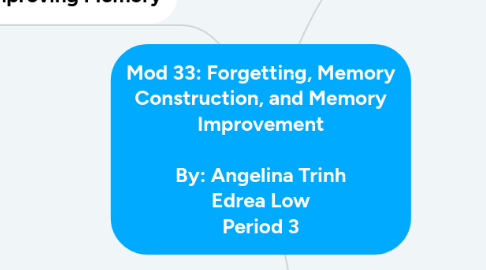
1. Memory Construction Errors
1.1. Source Amnesia
1.1.1. Attributing to the wrong source an event we have experienced, heard about, read about, or imagined
1.1.1.1. Ex: Singers may believe that they are composing an original song, when they are actually unintentionally plagiarizing a song they've heard before
1.1.1.2. Explains Deja Vu
1.1.1.2.1. The eerie sense that "I've experienced this before"
1.2. Misinformation and Imagination Effects
1.2.1. Misinformation Effect
1.2.1.1. Incorporating misleading information into one's memory of an event
1.2.1.2. Hearing a vivid retelling of an event can implant false memories
1.2.1.2.1. Ex: Hammers become screwdrivers, stop signs become yield signs, etc
1.2.2. Imagining False Memories
1.2.2.1. Using one's imagination to make up a completely false memory of an event that never happened
1.2.2.2. Repeatedly imagining a nonexistent event can lead to false memories
1.3. Children's Eyewitness Recall
1.3.1. Memories may be sincere, yet sincerely wrong
1.3.1.1. Children's memories can easily be molded
1.3.1.1.1. In this case, it is difficult to separate real from false memories
1.3.2. Children can still be reliable eyewitnesses
1.3.2.1. When questioned about their experience with words they can understand, children can accurately recall what happened and who did it
2. Improving Memory
2.1. Rehearse material repeatedly over sessions
2.2. Make material meaningful by taking notes or applying it to life
2.3. Activate retrieval clues and recreate situation
2.4. Use mnemonic devices and chunk information
2.5. Minimize interference by studying before sleep
2.6. Test your knowledge and do practice tests
3. Forgetting
3.1. Forgetting and the Two Track Mind
3.1.1. anterograde amnesia - inability to form new memories
3.1.1.1. Henry Molaison (H.M.) could not make new memories after brain surgery
3.1.1.2. these people can learn normal, nonverbal, and everyday tasks with no awareness of learning them
3.1.1.2.1. automatic processing ability forms implicit memories
3.1.1.2.2. they learn how to do something but don't remember actually learning about it
3.1.2. retrograde amnesia - inability to remember past information
3.2. Encoding Failure
3.2.1. When you fail to notice and encode information, leading to memory failure
3.2.2. without effort, many memories cannot form
3.3. Storage Decay
3.3.1. gradual fading of the physical memory trace
3.3.2. Hermann Ebbinghaus (1885) discovered that the course of forgetting is initially rapid, then levels off with time
3.4. Retrieval Failure
3.4.1. Proactive Interference
3.4.1.1. positive transfer - previously learned information facilitates learning of new information
3.4.2. Retroactive Interference
3.4.2.1. new learning disrupts recall of old information
3.4.2.2. information before sleep is less likely to be forgotten because there is less interference than during the day
3.4.3. Motivated Forgetting
3.4.3.1. Sigmund Freud proposed that we repress painful or unacceptable memories to protect our self-concept and to minimize anxiety
3.4.3.1.1. can be retrieved by some later cue or during therapy
3.4.3.2. harder to forger emotional events

